Canberra-KL ties boosted by Australian PM's historic visit to Malaysia
 By Taufik Ishak,
By Taufik Ishak,WNS Malaysia Correspondent
KUALA LUMPUR - Kuala Lumpur-Canberra relations received a strong boost with the historic visit of Australian leader John Howard, the first Prime Minister from the country to visit Malaysia in a decade. While the leaders agreed on the importance of furthering economic ties, they declined to hasten negotiations on a free trade deal. Both sides also agreed on the need to quickly restore peace in Iraq. Mr Howard's visit to Malaysia follows the ground-breaking trip Down Under by his Malaysian counterpart Abdullah Badawi last April. Mr Abdullah, who took office three years ago, had been the first Malaysian Prime Minister to visit Canberra in more than two decades. Analysts say the normalisation of the bilateral relations that had been rocky in the past under his predecessor Dr Mahathir Mohamad is an added feather in Mr Abdullah's cap.
The question now is how far can he build on improved bilateral ties? In an hour-long news conference, the 67-year-old Australian leader said cracks that plagued bilateral relations in the past have now healed. Mr Howard said: "I think it's fair to say our bilateral relationship is now as strong as it'd ever been. We have shared interests in the region." Both countries are working towards inking a Free Trade Agreement (FTA) as early as the middle of next year, although no specific time-frame was stated. Malaysia currently is Australia's second largest trading partner in South East Asia. Apart from trade and investment, the Middle East situation also dominated talks between the two prime ministers. The leaders agreed that there is an urgent need to restore peace and stability in war-torn Iraq, but they differed on the strategy.
Mr Howard believes international troops have a role to play, while Mr Abdullah wants a pull-out of all foreign soldiers. Mr Abdullah said: "We are all together addressing towards achieving stability in Iraq which can also pave the way out for foreign forces to leave Iraq and let the Iraqis deal with the situation and reconstruct Iraq." Mr Howard said: "It's right and fair to say our perspectives not the same but we are good enough friends and old enough friends to respect that and accept that we both recognise the importance of achieving stability in Iraq." While in Kuala Lumpur, Mr Howard also spoke at a lunch hosted by the Malaysia-Australia Business Council. He also gave out scholarships to Malaysian students. Educational ties between the two countries are strong. Australia is the top destination for Malaysians studying abroad, and more than 250,000 graduates have completed their studies there.
Fiji military stokes coup fears
 By Malenie Judy,
By Malenie Judy,WNS Pacific Bureau Chief
SYDNEY - Fiji's military has said it will conduct night-time exercises to secure strategic areas of the capital, Suva, citing fears of "foreign intervention". The announcement came amid warnings by Australia and other regional powers of an imminent coup in the Pacific nation. But Prime Minister Laisenia Qarase, who met the military's chief for talks on ending their stand-off, said he had been told no coup would take place. Mr Qarase said the planned exercises were "routine". Mr Qarase, who met with military chief Frank Bainimarama in New Zealand, said their talks had made substantial progress, and that he looked forward to further discussions. Fiji has been tense for weeks amid a public stand-off between the two sides, with military leaders accusing the government of corruption and deceitfulness.
In a statement on Wednesday, Fiji's military said the exercises were being carried out to protect the country. Troops in full combat dress would secure the centre of Suva between midnight and 0300 on Thursday, the army said, and "illumination rounds" would be fired into the sea. "The exercise is in anticipation of any foreign intervention and the Republic of Fiji Military Force is taking all precautionary measures," the statement said. The general public was advised to remain cautious when travelling into the centre of Suva, but urged not to be alarmed by the exercise. Cmdr Bainimarama has repeatedly threatened to overthrow the government, despite Fiji having been through three coups in 20 years. The heart of the feud between the military and Mr Qarase's government lies in plans by the government to offer amnesties to those involved in a racially-motivated coup six years ago.
The proposal is bitterly opposed by Cmdr Bainimarama, who put down the coup, and who at one stage was forced to flee for his life. Australia's Foreign Minister Alexander Downer said the situation remained worrying in Fiji, despite what he called a "helpful" meeting between the two men. Australia also said a Black Hawk helicopter had crashed into the sea near Fiji as it tried to land on HMAS Kanimbla. One person had died and another was missing. Australia sent three naval ships to Fiji earlier this month as a precaution in case its citizens needed evacuating.
Fiji coup could lead to removal from UN peacekeeping missions
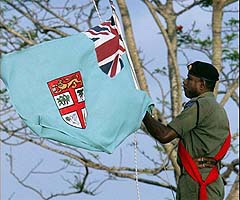 By Malenie Judy,
By Malenie Judy,WNS Pacific Bureau Chief
SYDNEY - United Nations Secretary General Kofi Annan has warned that Fiji would be withdrawn from UN peacekeeping missions if a feared military coup goes ahead, the government has said. Annan rang Fiji's prime minister, Laisenia Qarase, on Tuesday to say that a military coup would not be accepted or recognised, Fiji's government said in a press release. "A direct consequence would be that the UN would ask Fiji to withdraw from all UN peacekeeping operations," the statement quoted Annan as saying.
Qarase said he hoped the message from Annan would be taken seriously by Fiji's military. "It is our soldiers and the people generally who will bear the brunt of an unlawful takeover of government," the statement said. Fiji has about 1,000 troops involved in peacekeeping in the Sinai in the Middle East, Iraq and East Timor and the Solomon Islands. The peacekeeping duties provide a large income and considerable prestige for Fiji's military.
Fiji's rebellious military commander, Commodore Voreqe Bainimarama, has repeatedly threatened to force the government from power. He gave Qarase until Monday next week to comply with a list of "non-negotiable" demands. But a glimmer of hope for a peaceful solution emerged on Tuesday with the announcement Qarase and Bainimarama would meet in the New Zealand capital Wellington for talks on Wednesday.
Australia's PM Howard denies Iraq bribes cover-up
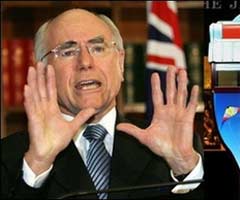 By Margaret Hilda,
By Margaret Hilda,WNS Sydney Correspondent
SYDNEY - Australian Prime Minister John Howard Monday denied any cover-up of the government's role in the payment of huge bribes to former Iraqi dictator Saddam Hussein ahead of the release of a damning report. Howard was speaking just hours before parliament was presented with the long-awaited conclusions of an inquiry into the corruption of the UN's oil-for-food programme in Iraq by national monopoly wheat exporter AWB.
The report is widely tipped to recommend criminal charges against former AWB executives but government officials, including Howard, are not expected to face legal action. Howard, heading into an election next year, rejected opposition charges that government complicity in the corruption had been shielded from investigation by limits to the commission of inquiry's terms of reference. "That allegation is totally false," he said in a radio address. Howard and two of his senior ministers were called to appear before the inquiry where they denied knowledge of the corruption by the AWB, formerly the Australian Wheat Board before it was privatised in 1999.
The inquiry by former judge Terence Cole was established in January after a UN report said AWB paid 220 million dollars in bribes to secure wheat contracts worth 2.3 billion dollars under the oil-for-food programme. The UN programme was designed to allow Iraq to use money from oil exports to buy food and medicine to relieve the civilian suffering caused by international sanctions against Saddam before he was toppled in 2003. The UN inquiry, led by former US federal reserve banking chief Paul Volcker, reported in October 2005 that AWB was the biggest offender among some 2,000 companies worldwide that were involved in corrupting the programme.
Lawyers aghast over racial comments
By Marcus Timothy,WNS Auckland CorrespondentAUCKLAND - Auckland lawyers are aghast at comments made by a District Court judge as he denied bail to an Asian man. They are accusing Judge Thomas Everitt of racism, after he refused bail to a man facing methamphetamine and ecstasy charges. He said the defendant would be able to get false travel documents, because 'in New Zealanders eyes people of Chinese extraction or race are difficult to identify, facially and by name'.Auckland QC Peter Williams says the comments are not acceptable coming from a judge.He says Chinese people generally come to New Zealand to work hard and integrate. Williams says the accused man is actually Malaysian rather than Chinese, and has lived in New Zealand for three years.
Water thieves tap supplies to beat the dry
 By Anthony Chance,
By Anthony Chance,WNS Australia Correspondent
MELBOURNE - Thieves have stolen enough water to fill more than 1200 Olympic-size swimming pools as the drought worsens. Goulburn-Murray Water is investigating 28 cases of water theft this year, involving up to 3000 megalitres. The authority's water delivery services manager, Ian Moorhouse, said tankers were used to steal the water from irrigation channels, or meters were tampered with. He said people from places with severe water restrictions were stealing water for their gardens. "You've got to be pretty desperate," Mr Moorhouse said. "We haven't prosecuted anybody … but we've identified a number of people who claim to be unaware that you can't just back up a tanker and take the water."
Penalties include a maximum fine of $6000 and six months' jail for a first offence, and a maximum $12,000 fine and a year's jail for further offences. "We've increased surveillance of our system, put staff out on weekends and at nights," Mr Moorhouse said. He said Goulburn-Murray Water, which is responsible for 68,000 square kilometres of land area and manages more than 70 per cent of the state's stored water, had a zero tolerance to water theft. "Water theft is not stealing from GMW, it's stealing from the community, because it's only a finite resource," he said. "With our irrigation systems, it's not like you just turn the tap on. You've got to order water and give several days' notice when you want it and the water's regulated through the channel system. So if someone takes it along the way, it doesn't get to where it's supposed to go. It affects other customers."
Northern Grampians police have reported signs that water thefts are on the rise. At Minyip, the fire brigade has been forced to padlock its bore tap. A sign next to the padlock tells people that water should not be taken without permission. In Melbourne, water companies City West Water, South East Water and Yarra Valley Water say water theft has yet to become a serious problem. One Carrum Downs man was charged in 2004 with stealing water after manipulating his water meter. South East Water spokesman Luke Enright said the company was investigating a customer's claim that water had been stolen from his holiday house at Frankston. He said the customer claimed the water was used to fill a neighbour's pool and water their garden."In instances like that, it's obviously difficult to prove but water theft is not a major issue for us at the moment," Mr Enright said. "We're obviously concerned about any theft from the system but there hasn't been a big spike in water theft."
Australia wheat bribes report due
 By Howart Dan,
By Howart Dan,WNS Australia Bureau Chief
SYDNEY - An Australian investigation into claims that the country's monopoly wheat exporter bribed Saddam Hussein is due to hand in its report. Government investigators have claimed that the Australian Wheat Board (AWB) paid $220m in kickbacks to the former Iraqi president. The AWB was the largest single supplier of humanitarian goods under the UN's oil-for-food programme. The scandal-ridden programme ran in Iraq from 1996 to 2003. Opposition politicians in Australia have described the AWB affair as the country's "biggest-ever corruption" scandal.
The wheat exporter is accused of paying bribes to Saddam Hussein to secure contracts worth more than $2bn under the UN's oil-for-food programme. The allegations have been investigated by the Cole Commission, which has heard more than 70 days of evidence in Sydney. Among the witnesses were Prime Minister John Howard and his foreign and trade ministers. They have denied knowing that kickbacks were being paid to the former Iraqi leader.
Dr Andrew Vincent from Macquarie University says the investigation into the AWB has made life uncomfortable for the prime minister. "It did seem to reveal that either the government didn't know what was happening," he said, "in which case the government was incompetent. "Or the government did know what was happening - in which case the government was colluding with an illegal act." The commission, headed by retired judge Terence Cole, will decide if the AWB broke any Australian laws in its dealings in Iraq. If it believes it did, then former company executives could be prosecuted.
Tongan king pledges democratic change
 By Malenie Judy,
By Malenie Judy,WNS Pacific Bureau Chief
SYDNEY - Tonga's king has pledged to move ahead with democratic change in the Pacific nation despite deadly rioting in the capital last week. In a speech closing the parliamentary session in Nuku'alofa, King George Tupou V told dignitaries that differences among reform proposals could be resolved. He also deplored the violence of last Thursday's rioting which killed at least six people and called for those responsible to be firmly dealt with.
Australian and New Zealand troops in Tonga to help enforce a state of emergency were not stationed near the parliament building inside Nuku'alofa's tightly restricted city centre. "All the proposals that are now in the public arena have the same ultimate aim - a more democratic form of parliament and government but appropriate for Tonga - about which we all agree," King George said. "The differences among these various proposals are not irreconcilable and can be resolved through dialogue." The king said the cost of rebuilding the city centre mostly destroyed by fires would be at least $US200 million ($NZ298 million). "We have to rebuild our sense of mutual responsibility to each other so that never again will we see violence, arson, looting, death - and such shame. "The justice system will do its work and distinguish between lawful protest and unlawful activities, and to deal with them firmly and speedily according to law. "Instigators of violence and crime must be dealt with firmly."
After the ceremony democracy movement leader 'Akilisi Pohiva welcomed the call for further dialogue. However one noble member of parliament boycotted the event saying he did not want to sit alongside terrorists, referring to pro-democracy MPs.
Takeover approach targets Qantas
 By Peter Joseph,WNS Syndey Business CorrespondentSYDNEY - Australia's biggest airline Qantas has received a takeover approach from Macquarie Bank and Texas Pacific. "The approach is confidential and incomplete and is being investigated by Qantas," the airline said. News of the approach drove Qantas shares up by as much as 20%, but they later fell back to close up 15%. Earlier reports had suggested Macquarie - an Australian investment bank - was working on a bid worth up to 10.3bn Australian dollars. In a statement issued soon after the market closed, Macquarie said it had held preliminary "indicative talks" with Qantas over the possibility of a takeover.The possibility of the company ending up in foreign hands has worried trade unions. Doug Cameron, national secretary of the Australian Manufacturing Workers' Union, said: "We are calling on the government to say quite clearly that the jobs should stay in Australia because we depend on Qantas for our transport, our defence, and in the case of emergencies when Australians are oversees." Government Transport Minister Mark Vale responded by saying: "It's a well known fact that there are individual shareholding limits and also foreign ownership on Qantas. "We don't have any view about changing that," he added. Government-imposed limits restrict any single investor in the flag-carrier to a stake of 25%, while stakes owned by foreigners cannot exceed 49%.
By Peter Joseph,WNS Syndey Business CorrespondentSYDNEY - Australia's biggest airline Qantas has received a takeover approach from Macquarie Bank and Texas Pacific. "The approach is confidential and incomplete and is being investigated by Qantas," the airline said. News of the approach drove Qantas shares up by as much as 20%, but they later fell back to close up 15%. Earlier reports had suggested Macquarie - an Australian investment bank - was working on a bid worth up to 10.3bn Australian dollars. In a statement issued soon after the market closed, Macquarie said it had held preliminary "indicative talks" with Qantas over the possibility of a takeover.The possibility of the company ending up in foreign hands has worried trade unions. Doug Cameron, national secretary of the Australian Manufacturing Workers' Union, said: "We are calling on the government to say quite clearly that the jobs should stay in Australia because we depend on Qantas for our transport, our defence, and in the case of emergencies when Australians are oversees." Government Transport Minister Mark Vale responded by saying: "It's a well known fact that there are individual shareholding limits and also foreign ownership on Qantas. "We don't have any view about changing that," he added. Government-imposed limits restrict any single investor in the flag-carrier to a stake of 25%, while stakes owned by foreigners cannot exceed 49%.
Australia report gives nuclear nod
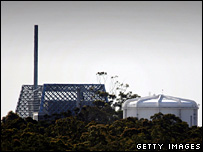 By Robert Hudson,
By Robert Hudson,WNS Canberra Correspondent
CANBERRA - Nuclear power is a viable option for meeting Australia's future energy needs, a new government report says. The report, ordered by PM John Howard in June, said Australia could have a nuclear enrichment and power industry within 10 to 15 years. It said the country could have about 25 nuclear reactors, supplying one-third of its electricity needs by 2050. Australia has about 40% of the world's uranium, but most of its energy needs at present are met by coal and gas. Mr Howard ordered the report to look at whether Australia should develop a nuclear industry, which successive governments have so far shunned.
The report - by a team of experts, led by nuclear physicist Ziggy Switkowski - said that nuclear power could be competitive with coal-fired power if pollution and carbon emissions were taxed. A shift to nuclear energy would also help the country tackle pollution and cut greenhouse emissions. Because of its heavy dependence on coal, Australia at present has the highest per capita greenhouse emissions in the world.
The move towards nuclear has been questioned by Mr Howard's political opponents. The opposition Labour Party, which introduced a ban on any new uranium mines while in power in 1983, asked him to explain where the nuclear reactors would be built and where the radioactive waste would be dumped. "If [Mr] John Howard is re-elected, we will go down an inexorable course for 25 nuclear reactors in this country and tens of thousands of tonnes of nuclear waste," news agency Reuters quoted Labour leader, Kim Beazley as saying. The move has also been opposed by the environmental and coal lobbies. Critics argue that Australia does not need nuclear power because of its huge coal resources. But the Meteorology Bureau's announcement in January that 2005 had been Australia's hottest year on record prompted renewed fears of global warming.
Australia is one of only two major industrialised nations not to have signed the Kyoto agreement on reducing greenhouse gas emissions, the other being the US. Australia faces international pressure to reduce emissions, and experts say nuclear power could be one way to do it. Australia currently has one small research reactor, located at Lucas Heights in Sydney. "Nuclear power is the least costly, low-emission technology that can provide baseload power available today and can play a role in Australia's future generation mix," the report said.
Tongan PM speaks of riot 'shame'
 By Malenie Judy,
By Malenie Judy,WNS Pacific Bureau Chief
SYDNEY - Tongan prime minister Fred Sevele has described the recent violence over democratic reforms as "a day of shame". In an interview, he cited the need to restore law and order as his reason for appealing to Australia and New Zealand for extra soldiers and police. At least eight people died when crowds ransacked much of the centre of the Pacific nation's capital, Nuku'alofa. The city is now said to be calm. The unrest was sparked by concern about the slow pace of democratic reform. The government has now announced major changes ahead of elections in 2008.
In remarks broadcast by Australian radio on Sunday, the prime minister said he had no intention of stepping down."I never thought that the day would come where I see Tongans taking to the streets like that. It's a day of shame for us Tongans," Mr Sevele said. "My main concern is to look at what needs to be done to reconstruct Tonga, to bring back law and order into this society, and that is why we have asked Australia and New Zealand for some assistance." About 150 back-up soldiers and police officers have arrived in Tonga - Australia sent about 85 men, with New Zealand providing the remainder.
Australia's Prime Minister John Howard and his New Zealand counterpart Helen Clark announced the mission at a joint press conference in Vietnam, where they were attending a regional summit. "Being the largest and wealthiest countries in the region, part of our responsibility is to help," said Mr Howard. Many buildings in Nuku'alofa have been destroyed in the rioting, including the government and prime minister's offices, the power company, Nuku'alofa's only bank and a number of Chinese-owned shops. They have been agitating for political reform in a country where the king wields enormous power. The embattled government of Mr Sevele has now announced sweeping reforms, which it is hoped will soothe tensions, our correspondent says. The intervention by Australia follows similar action in the Solomon Islands and comes amid fears of a military coup in Fiji, our correspondent adds. Australia is concerned that trouble in the region could be exploited by extremists or drug traffickers.
Man killed in violent home invasion
 By Marcus Timothy,
By Marcus Timothy,WNS Auckland Correspondent
AUCKLAND - South Auckland detectives have begun their second homicide inquiry of the weekend, after a man died in a violent home invasion overnight Saturday. The 27-year-old was assaulted, bound and gagged at his home in Botany. He lived there with his partner and the couple's young child. About 35 detectives have been called in to investigate the brutal death. Police are still working on the details, but say three people are believed to have been involved.
Detective Senior Sergeant Neil Grimstone says the man's partner and child were at home when the murder happened. He says it was an was extremely traumatic experience, and they are absolutely shattered and distraught. Police are offering as much support as they can. The cause of the man's death and why he was targeted remain a mystery. Grimstone says officers are going door to door around the neighbourhood, and ESR scientists are conducting a scene examination. Police urgently need information from people who saw anything suspicious going on in or near Kirikiri Lane in Botany.
Neighbours of the man are stunned by his violent death. A neighbour says it's a scary thing to have happened in your neighbourhood, especially when you are bringing up a small child. Meanwhile, a post-mortem is due to take place on the body of a 33-year-old man, who died after a beating in South Auckland in the early hours of Saturday morning. An argument apparently erupted into a stoush with a group of people in Williams Park. Paramedics tried but failed to revive him at the scene. Gang involvement has been ruled out and police have already spoken to eyewitnesses about what happened. So far no-one has been arrested.
Overseas troops arrive in Tonga
 By Malenie Judy,
By Malenie Judy,WNS Pacific Bureau Chief
SYDNEY - About 150 soldiers and police officers from Australia and New Zealand have arrived in Tonga following an appeal for help to restore order after riots. At least eight people died when crowds ransacked much of the centre of the Pacific nation's capital, Nuku'alofa. The city is now said to be calm but a state of emergency has been declared. The unrest was sparked by concern about the slow pace of democratic reform. The government has now announced major changes ahead of elections in 2008.
Australia has sent about 85 of the troops and police officers deployed, with New Zealand providing the remainder. Australia's Prime Minister John Howard and his New Zealand counterpart Helen Clark announced the mission at a joint press conference in Vietnam, where they are attending a regional summit. "Being the largest and wealthiest countries in the region, part of our responsibility is to help," said Mr Howard.
Many buildings in Nuku'alofa have been destroyed in the rioting, including the government and prime minister's offices, the power company, Nuku'alofa's only bank and a number of Chinese-owned shops. The rioting began after the government assembly failed to pass democratic reforms before it went into recess. The Tongan king appoints 10 of the 14 cabinet members to their posts for life, with the other four reserved for "nobility". Hereditary noblemen hold the majority of seats in the country's parliament. After the death of King Taufa'ahau Tupou IV in September, a government committee recommended that all lawmakers be elected by the public. King Tupou IV reigned for 41 years and was opposed to reforms. His son and heir, Siaosi Tupou V, is thought to be more in favour of change.
Six found dead after Tonga riots
 By Malenie Judy,
By Malenie Judy,WNS Pacific Bureau Chief
SYDNEY - Six bodies have been found amidst debris left by rioting in Nuku'alofa, capital of the Pacific nation of Tonga. Hundreds of youths destroyed buildings and looted shops on Thursday, in protests sparked by government delays in implementing democratic reforms. The government has now said new elections will be held in 2008 to elect a more democratic parliament. Tonga is poised to request up to 200 troops from Australia and New Zealand to help protect key buildings. "We are now working on the details of an agreement to allow personnel from New Zealand and Australia to secure the airport" and other strategic sites, said Lopeti Senituli, a spokesman for Prime Minister Fred Sevele. Air New Zealand cancelled flights to Tonga for a second day on Friday.
Police said that more bodies might be found, as debris was cleared from damaged buildings. The six dead were believed to have been rioters. "We are waiting for DNA tests to confirm as the bodies are beyond recognition," said assistant police commissioner Unca Faaoa. Up to 80% of buildings in Nuku'alofa were estimated to have been destroyed, including the government and prime minister's offices, the power company, Nuku'alofa's only bank and a number of Chinese-owned shops.
Tongan riots after reforms delay
 By Malenie Judy,
By Malenie Judy,WNS Pacific Bureau Chief
SYDNEY - Tonga's capital Nuku'alofa has been hit by riots after pro-democracy groups protested against a government delay in implementing political reforms. Rioters smashed windows in the prime minister's office and other government buildings and overturned cars. Calls for more democracy have grown over the last year, and were fanned by the old king's death in September. The South Pacific nation's king and hereditary noblemen hold the majority of seats in the country's parliament.
The rioting began after the government assembly failed to pass democratic reforms before it rises for the year later on Thursday, Radio New Zealand International said. Thousands of pro-democracy supporters were demanding that a vote on a new democratic constitution be held this year. "People threw stones at the prime minister's office," said the RNZI reporter in Nuku'alofa. They turned over police vehicles and vehicles of the prime minister's office," said Mateni Tapueluelu. "They have also done the same to a supermarket owned by the prime minister and there are men marching to the villa where the king is supposed to be residing." Pro-democracy demonstrations last year culminated in a series of strikes that brought the capital Nuku'alofa to a standstill.
Australia's Telstra sees sharp upturn after weak first half
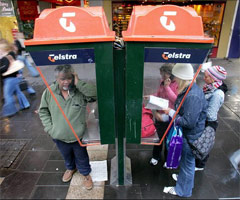 By Trinity Hizon,
By Trinity Hizon,WNS Australia Business Correspondent
SYDNEY - Australian telecom giant Telstra expects 37-40 percent growth in earnings before interest (EBIT) in the six months to June 2007 after a weak first half, the company's annual general meeting was told on Tuesday. The current fiscal year will see the largest transformation for the troubled telco, said chairman Donald McGauchie. "As a result, we expect our first-half (to December 2006) EBIT to fall by 17 to 20 percent. However, we expect EBIT to grow in the second half in the range of 37-40 percent," he told shareholders.
"Provided there are no further material adverse regulatory outcomes and we continue to be successful in implementing our transformation strategy, we expect our free cash flow to improve in fiscal 2008 compared with fiscal 2007." McGauchie said the group has taken "some pretty tough medicine" but is now turning around with a change in culture. His comments come as the Australian government is selling down part of its 51.8 percent stake ahead of fully privatising Australia's largest telecommunications company. The retail investor component of the offer ended this week, with the government expected to raise around 11 billion dollars (8.5 billion US) from the sale of about one-third of its remaining stake.
McGauchie said the appointment of American Sol Trujillo in July last year as chief executive of Telstra, together with an expanded and experienced management team, has resulted in improved performance. "This is a significant transformation that your company is undertaking and we are just over one year into it," he said. Telstra's share price tumbled more than 30 percent in a year after Trujillo took over in July 2005 to implement reforms while annual profits dropped more than 25 percent.
Australian PM backs off opposition to carbon trading
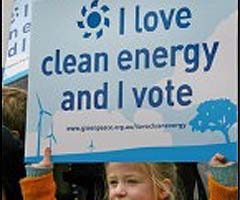 By Samson Zahn,
By Samson Zahn,WNS Australia Senior Correspondent
SYDNEY - Australian Prime Minister John Howard has thrown his weight behind a global carbon trading scheme to reduce greenhouse gases as he scrambles to counter criticism of Canberra's environmental policy. But the conservative prime minister, who is set to meet with his ally US President George W. Bush at the weekend to discuss issues including climate change, insisted that any such system should not hurt Australia's economy. Howard signalled a major policy shift on carbon emissions trading in a speech late Monday, announcing his government, which was until very recently sceptical that climate change was a problem, is setting up a taskforce to find ways of reducing greenhouse gases that cause the phenomenon.
"The government will establish a joint government-business task group to examine in some detail the form that an emissions trading system here in Australia and globally might take in the years ahead," he told a Business Council of Australia dinner. "I think the weight of scientific evidence suggests that there are significant and damaging growths in the levels of greenhouse gas emissions," he said, denying he was a climate change sceptic. "And unless we lay the foundation over the years immediately ahead of us to deal with the problem, future generations will face significant penalties and will have cause to criticise our failure to do something substantial in response." Howard's government, which has refused to sign the Kyoto Protocol on climate change on the grounds that the cost of limiting greenhouse gas emissions could damage
Australia's booming economy, has in recent weeks begun pushing for a new Kyoto agreement. Howard has repeatedly said that carbon trading is no silver bullet solution to reducing greenhouse gas emissions and has insisted that Australia would not join any such scheme unless Asia's booming economies also signed up. But on Monday he acknowledged that countries such as India and China, which depend on Australia's vast fossil-based natural resources, would never agree to environmental controls that would hinder their "energy security". Their economic growth was "very largely fuelled and supported and facilitated by cheap supplies of energy from countries such as Australia, but also from their own and from other sources," he said.
Australia to press for "New Kyoto" at UN talks
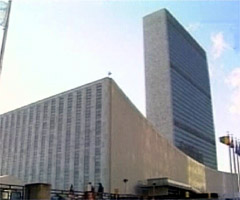 By Howart Dan,
By Howart Dan,WNS Australia Bureau Chief
SYDNEY - Australia, an outsider at a major UN conference on climate change in Nairobi because it refuses to ratify the Kyoto Protocol, will press for a "New Kyoto" deal, the government said Monday. Environment Minister Ian Campbell said there was growing support for the idea from countries disillusioned with the current plan to reduce greenhouse gas emissions blamed for global warming. "There is great enthusiasm for Australia's position on 'New Kyoto'," he told the Australian Broadcasting Corporation. "Even the existing Kyoto signatories know it's not working and we need a better agreement."
Macfarlane will represent Australia at the UN conference in Nairobi this week, but the country's delegation has been sidelined with observer status because of its refusal to ratify the protocol. The government's proposal for a "New Kyoto" has been dismissed by critics, including the Australian Green Party. "It's just seen as a joke," said Greens Senator Christine Milne, who is in Nairobi for the meeting. The Australian delegation is viewed as "a sideshow to the main game," she told ABC radio. Australia and the United States are the only countries to have refused to ratify the Kyoto Protocol, charging that it could harm their economies and that developing countries do not face the same restrictions.
But in the face of Australia's worst drought in a century and voters' calls for action on climate change, Prime Minister John Howard's government has recently dropped its public scepticism over global warming. Last month, as scientific evidence of the economic consequences of climate change mounted, Howard announced that A$500 million (US$385 million) would be spent on a series of clean energy initiatives. In Nairobi this week, the Conference of Parties to the UN Framework Convention on Climate Change is expected to draw 6,000 experts, officials and lobbyists from 189 nations. Delegates at the conference are focusing on the future after the Kyoto Protocol expires in 2012.
Australia rejects criticism of new Indonesian security pact
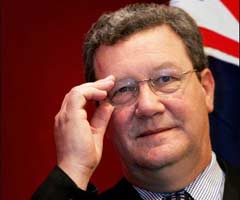 By Robert Hudson,
By Robert Hudson,WNS Canberra Correspondent
CANBERRA - The Australian government has denied that a new security pact with Indonesia means that it would be party to the suppression of Indonesian separatists. The treaty includes a key Indonesian demand that Australia will not support separatist causes in the sprawling archipelago, after Jakarta tore up a previous pact over Canberra's support for independence for East Timor. Critics fear the new agreement to increase military and intelligence ties could see Australia aiding crackdowns on independence activists in the restive province of Papua.
But Defence Minister Brendan Nelson rejected the concerns during an interview on Australian television. "That's a highly provocative statement -- most certainly not," he said. The new agreement, to be signed Monday on the Indonesian resort island of Lombok, comes hard on the heels of a diplomatic row over Australia's granting of asylum to 43 Papuan separatists early this year. Nelson indicated, however, that the treaty would not see local intelligence agencies monitoring the activities of Papuans in Australia and sharing the information with Indonesia. "I can assure you that we don't use intelligence in relation to specific issues and certainly not in relation to separatism," he said.
The treaty, which also covers cooperation against terrorism and on border security, will have to be ratified by both parliaments after being signed by foreign ministers Alexander Downer and Hassan Wirajuda. The opposition Labor Party said Sunday it would reserve judgement on the agreement until it is able to study it in detail. Indonesia won sovereignty over Papua, formerly a Dutch colony, in 1969 after a referendum widely seen as a sham. Papuans have long accused Indonesia's military of violating human rights in the province and complain that the bulk of earnings from its rich natural resources flow to Jakarta.
Britain, New Zealand in step on trade, global warming, Clark says
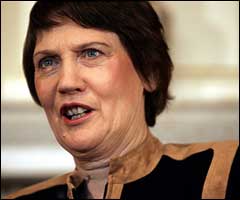 By Suzie Decker,
By Suzie Decker,WNS London Correspondent
LONDON - New Zealand's Prime Minister Helen Clark said she and British counterpart Tony Blair were "talking the same language" on climate change and world trade after discussions in London. The pair said links between Britain and its former colony were strong not just for historical reasons but because of their common lines of attack on the world's pressing concerns. "We find when we sit down on issues like climate change, like trade, we're talking the same language," Clark told reporters at Blair's Downing Street office.
She said the pair had discussed their strategies for the United Nations climate change conference in Nairobi, which started Monday and runs until November 17. She said she had been "greatly comforted" by the British government's stance on "food miles" -- the distance food travels before reaching the consumer and its environmental impact. "On the issues of trade, Britain is working as strongly as it can within its circles to ensure we try to get some revival of the Doha round which is pretty critical for confidence in the world economy," she added.
Blair visited Auckland in March, where he made a major speech on tackling climate change, calling for an international agreement while warning that any deal would fail unless it included the United States, China and India. On Thursday he congratulated New Zealand "on the aspiration to be a carbon-neutral economy". "For New Zealand to give this type of leadership at this time is a tremendous signal to send right across the world," he said. "Whether it's on climate change or world trade ... or in the work that we're doing together in Afghanistan, there's an immense amount of common ground."
 By Taufik Ishak,
By Taufik Ishak, By Taufik Ishak,
By Taufik Ishak, By Malenie Judy,
By Malenie Judy, By Malenie Judy,
By Malenie Judy, By Margaret Hilda,
By Margaret Hilda, By Anthony Chance,
By Anthony Chance, By Howart Dan,
By Howart Dan, By Malenie Judy,
By Malenie Judy, By Peter Joseph,
By Peter Joseph, By Robert Hudson,
By Robert Hudson, By Malenie Judy,
By Malenie Judy, By Marcus Timothy,
By Marcus Timothy, By Malenie Judy,
By Malenie Judy, By Malenie Judy,
By Malenie Judy, By Malenie Judy,
By Malenie Judy, By Trinity Hizon,
By Trinity Hizon, By Samson Zahn,
By Samson Zahn, By Howart Dan,
By Howart Dan, By Robert Hudson,
By Robert Hudson, By Suzie Decker,
By Suzie Decker,